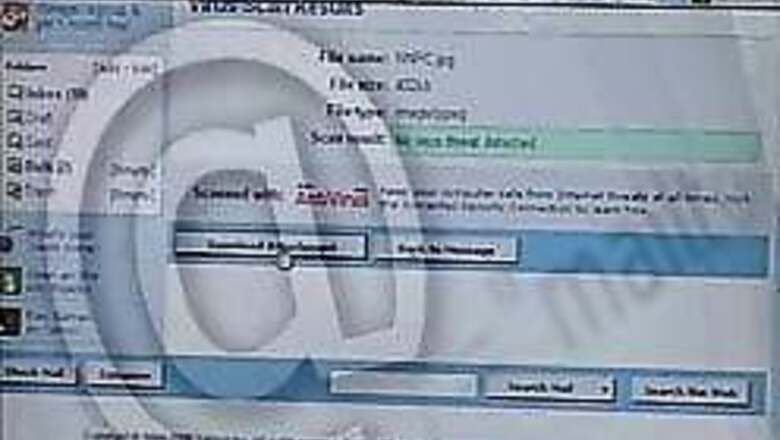
views
- Congratulations !!!! Winning final notification award 2006.
- Claim your prize!!!!! Confirm with the redemption center / agency
- Check money on won promotion - Lottery award price winning notification
- Congratulations! Your email address has won USD1.000.000.00
- Yes, it is true. You can process instant rebates online and make $15 each!
Sounds familiar? Just how many times have you received similar mails declaring you the winner of a lottery you had never applied for or offering you money without even bothering as much as to work?
And if you are one of those who unsuspectedly fell for the false lure, you will surely smell a spam next time you get one.
Spam is a term used to describe unwanted, unsolicited emails that flood our inboxes daily. It's essentially electronic junk mail that eats up precious inbox space. However, dealing with spam goes beyond just clicking on the delete option as it is more harmful than just being irritating.
Seemingly innocuous, spam has claimed may unsuspecting victims and spam scams are very common. Scammers – person/s who indulge in fraudulent deals on the web – use various ploys to attract customers and know how to make their claims seem legitimate.
IBN-LIVE brings you the essential spam alert guide. How to spot a spam scam and how to save yourself from it
PAGE_BREAK
1. The 'Nigerian' e-mail Scam: It’s the most notorious and yet most common scam on the web. Recently, a Nigerian national was arrested in Mumbai for running a huge online business racket on the net.
The lure: Scammers claim to be hard-pressed-for-money officials, businessmen or family members of former government officials in Nigeria whose money is somehow tied up for a limited time.
They offer to transfer a huge sum of money into your bank account provided you agree to pay up a “small amount" as fee or tax, to help them access their money. If you respond to the initial offer, you may receive documents that look official.
They demand money to cover costs for transaction, transfers and legal fees, bank account numbers and/or other information. They also throw in offers of traveling to Nigeria or a border country to complete the transaction.
The catch: The emails are send from fraudsters trying to steal either money or identity. More often than not, the biggest catch are the emergencies that come up and require more money and delay the 'transfer' of funds to your account. Ultimately, you get no profits, no money and no lottery and the csammer disappears completely from the virtual world with your money.
The safety net: Do not respond to any mail from anyone claiming to need monetary assistance to get out of a foreign country.
PAGE_BREAK
2. Phishing: Another common business deal that usually operates from under the guise of your bank or a company known to you.
The lure: An email or pop-up message that claims to be from a business or organisation you deal with, like, an internet service provider, bank or online payment service. The message may ask you to 'update', 'validate', or 'confirm' account information.
The catch: Phishing is a scam where internet fraudsters send pop-up messages to extract personal and financial information from you. The messages may direct you to a an innocuous looking website . Howvere, the site is bogus and exists simply to trick you into revealing your personal information.
The safety net: Never respond to email or pop-up messages that ask for your personal or financial information and don't click on links in the message.
Don't cut and paste a link from the message into your browser - phishers make the links look like leading to a genuine site. However, they direct you to a look-alike site. The best way to go about it is to open the URL in a fresh browser session and key-in the correct URL yourself. Always use anti-virus software and a firewall and keep them updated.
PAGE_BREAK
3. Work-at-home scams: This is the easiest to fall for.
The lure: Ads promise a large income for minimal work which may include menial tasks like envelope-stuffing or craft assembly work. The ads promise - fast cash, minimal work, no risk and the advantage of working from home at your convinience.
The catch: The claims do not reveal that one might have to work many hours without pay, or at hidden costs to place newspaper ads, make photocopies, buy supplies, software or equipment to do the job.
Once you put in time and money, the promoters can refuse to pay you, claiming 'poor work quality’.
Your safety net: Always get a clear picture of what exactly you are required to do. Before you commit any money, find out
· What the job profile is
· Whether you will be paid a salary or stipend
· Who is the authority
· When you will get your first payment
· The total cost of the program (including hidden costs)
· What you will get for your money.
Get professional advice from a lawyer, an accountant, a financial adviser, or another expert if you need it, and check out the company with your local Trading Standards Service.
PAGE_BREAK
4. Weight loss claims: This scam has mostly women or elderly men falling for the claim.
The lure: E-mails promising a revolutionary pill, patch, cream, or other product that will result in weight loss without diet or exercise guaranteeing permanent weight loss at lightning speed.
The catch: These are gimmicks, there's nothing available through email you can wear or apply to your skin that can cause permanent or even significant weight loss.
The safety net: Experts agree that the best way to lose weight is to eat fewer calories and increase your physical activity so you burn more energy. There are no products that can instantly remove fat.
PAGE_BREAK
5. Foreign Lotteries: Believe it or not, this scam has the maximum number of people falling for it.
The lure: E-mails boasting enticing odds in foreign lotteries or message claiming you've already won. You just have to pay to get your prize or collect your winnings.
The catch: Lottery scammers use victims' bank account numbers to make unauthorised withdrawals or use credit card numbers to run up additional charges.
Your safety net: Just skip these offers.
PAGE_BREAK
6. Cure all remedies
The bait: E-mails claiming that a product is a 'miracle cure', a 'scientific breakthrough', an 'ancient remedy' - or a quick and effective cure for a wide variety of ailments or diseases.
They generally announce limited availability, and want payment in advance, and offer a no-risk 'money-back guarantee'.
The catch: There is no product or dietary supplement that can deliver on claims to shrink tumors, cure insomnia, impotency, Alzheimer's disease and prevent severe memory loss.
The safety net: Be skeptical about health related claims. Consult a health care professional before buying any 'cure-all' claims.
PAGE_BREAK
7. Cheque overpayment scam:
The lure: A response to ad or online auction posting, offering to pay with a cheque. At the last minute, the so-called buyer comes up with a reason for writing the cheque for more than the purchase price, and asks you to transfer back the difference after you deposit the cheque.
The catch: If you deposit the cheque, you lose. Typically, the cheques are counterfeit, and if the y bounce, you end up paying for it.
The safety net: Do not accept a cheque for more than your selling price, no matter how tempting the plea or convincing the story.
PAGE_BREAK
8. Pay-in-advance scam:
The lure: Mail claiming you've been 'pre-qualified' to get a low-interest loan or credit card, or repair your bad credit even though banks have turned you down.
The catch: To take advantage of the offer, you have to pay a processing fee of several hundred pounds. You still have to complete an application and you can still be turned down.
The safety net: Don't pay for a promise. Legitimate lenders never 'guarantee' a card or loan before you apply.
PAGE_BREAK
9. Debt relief
The bait: E-mails promise a way you can consolidate your bills into one monthly payment without borrowing and stop credit harassment, repossessions or wipe out your debts.
The catch: These offers can involve bankruptcy proceedings, but rarely say so. A bankruptcy stays on your credit report, and can make it harder to get credit, a job, insurance, or even a place to live. To top it off, you are likely to be responsible for legal fees for bankruptcy proceedings.
The safety net: Read between the lines when looking at these emails. Before resorting to bankruptcy, talk with your creditors about arranging a modified payment plan, contact a credit counselling service to help you develop a debt repayment plan, or carefully consider a second mortgage or home equity line of credit.
PAGE_BREAK
10. Invest Schemes:
The lure: E-mails touting 'investments' that promise high rates of return with little or no risk.
The catch: Many unsolicited schemes are a good investment for the promoters, but not for you. Promoters of fraudulent investments operate a particular scam for a short time, close down before they can be detected, and quickly spend the money they take in.
The safety net: Think carefully about investments - the higher the promised return, the higher the risk. Strongly consider asking an accountant to take a look at any investment offer.
You can also report spam to your Information Comissioner's Office, by competing a form with details of the spam.
Disclaimer: The information is only to provide general guidance and should not be read as a substitute for the law.
(Source: OFT, UK. Office of Fair Trading or OFT is a UK statutory body established by the Enterprise Act 2002, which seeks to protect the consumer from anti-competitive practices.)















Comments
0 comment